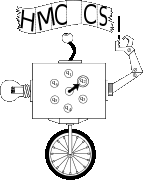Events for September 2015
Welcome, announcements, and CS poster session!
Colloquium
- Speaker(s)
- Ran Libeskind-Hadas
- Date
- Thursday, September 3, 2015
- Location
- Shanahan Auditorium
The first colloquium of the year will begin with a few announcements followed by a poster session for research performed in the CS Department this past summer.
(OPTIONAL COLLOQUIUM) Why (and how to) go to graduate school in CS (and related fields)
Colloquium
- Speaker(s)
- Ran Libeskind-Hadas
- Date
- Thursday, September 10, 2015
- Location
- Shanahan Auditorium
This talk (and subsequent Q&A session) address questions like: What is graduate school in CS all about? Is it true that you get paid to get a PhD? (spoiler alert: “Yes!”) What is like to be a graduate student? What can you do with a graduate degree in CS that you can’t do without one? What are the financial implications long-term? What is the application process like?
Physics-Based Simulation in Computer Graphics and Biology
Colloquium
- Speaker(s)
- Tamar Shinar (UC Riverside)
- Date
- Thursday, September 17, 2015
- Time
- 4:00 PM – 5:15 PM
- Location
- Shanahan Auditorium
Computer simulation of natural phenomena is used in areas as diverse as mechanical engineering, cellular biology, and special effects for movies. Phenomena of interest span a broad range materials and scales: e.g., fire, water, and solid objects on the macroscopic scale of everyday experience, and mitosis on scale of a single biological cell. In this talk, I’ll describe some of the physics, mathematics and algorithms used to simulate natural phenomena for computer graphics and the biological sciences.
Bio: Tamar Shinar is the Amrik Singh Poonian Assistant Professor of Computer Science at the University of California, Riverside. She received the B.S. in mathematics from UIUC and the Ph.D. from Stanford in Scientific Computing and Computational Mathematics.
Machine learning approaches to personalized medicine and genomics
Colloquium
- Speaker(s)
- Gerald Quon (MIT)
- Date
- Thursday, September 24, 2015
- Time
- 4:00 PM – 5:15 PM
- Location
- Shanahan Auditorium
One of the principal challenges of medicine is to find robust biomarkers, or predictors, of patient response to therapies and disease outcome, in order to better assign personalized treatments to patients. While the “Big Data” revolution in biology has enabled clinicians to measure millions of candidate biomarkers in patients, our ability to find robust predictors of treatment efficacy and disease outcome has lagged, in large part due to heterogeneity in patient cohorts, data types and measurement instruments. Fortunately, the field of machine learning has made tremendous progress in terms of developing mixture models that efficiently handle different types of heterogeneity.
In this talk, I will discuss how probabilistic topic models, originally designed to solve problems in information retrieval and nature language processing, are readily adapted to address problems in data heterogeneity in the clinic, and illustrate how they have been used to improve our ability to predict outcome of cancer patients.
Gerald Quon is an assistant professor in the Department of Molecular and Cellular Biology at UC Davis. He obtained his B. Math in Computer Science at the University of Waterloo, his Ph.D. in Computer Science from the University of Toronto, and completed postdoctoral research training at MIT.
